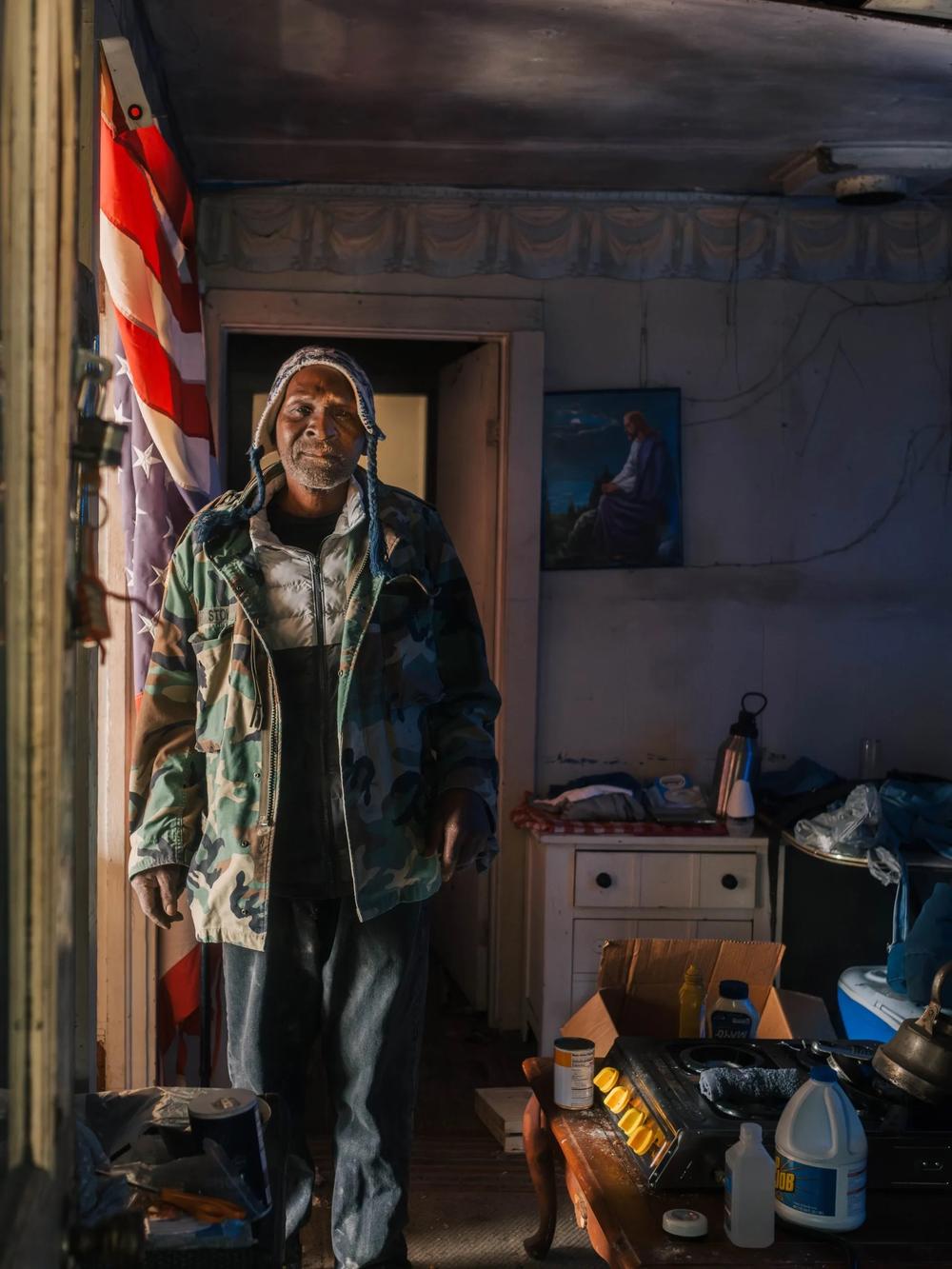
Caption
Jimmy 'Butch" Heck, stands in the abandoned house he's lived in for the past two years, Feb. 1, 2024. Heck has also been selected as one of the first tiny home residents.
Credit: Justin Taylor / The Current GA

Jimmy 'Butch" Heck, stands in the abandoned house he's lived in for the past two years, Feb. 1, 2024. Heck has also been selected as one of the first tiny home residents.
Justin Taylor, The Current
For the last four years, Fraisher Poole, a 66-year-old grandmother, has been living on the streets of the town where she grew up and raised her own family.
For more than six months, she has been anxiously waiting for news that she can turn the keys and walk into a new home built by Hand in Hand of Glynn, an organization dedicated to transitioning those experiencing homelessness into a stable life.
Poole is one of the 10 Glynn County natives selected to be the first people to move into the tiny home community on Altamaha Avenue in Brunswick. Yet despite four years of planning and $4 million in private donations spent on construction, the group’s 60 fully furnished homes remain vacant, an unfortunate illustration of how bureaucratic red tape can frustrate even the most determined advocates trying to solve the problem of homelessness in Glynn County.
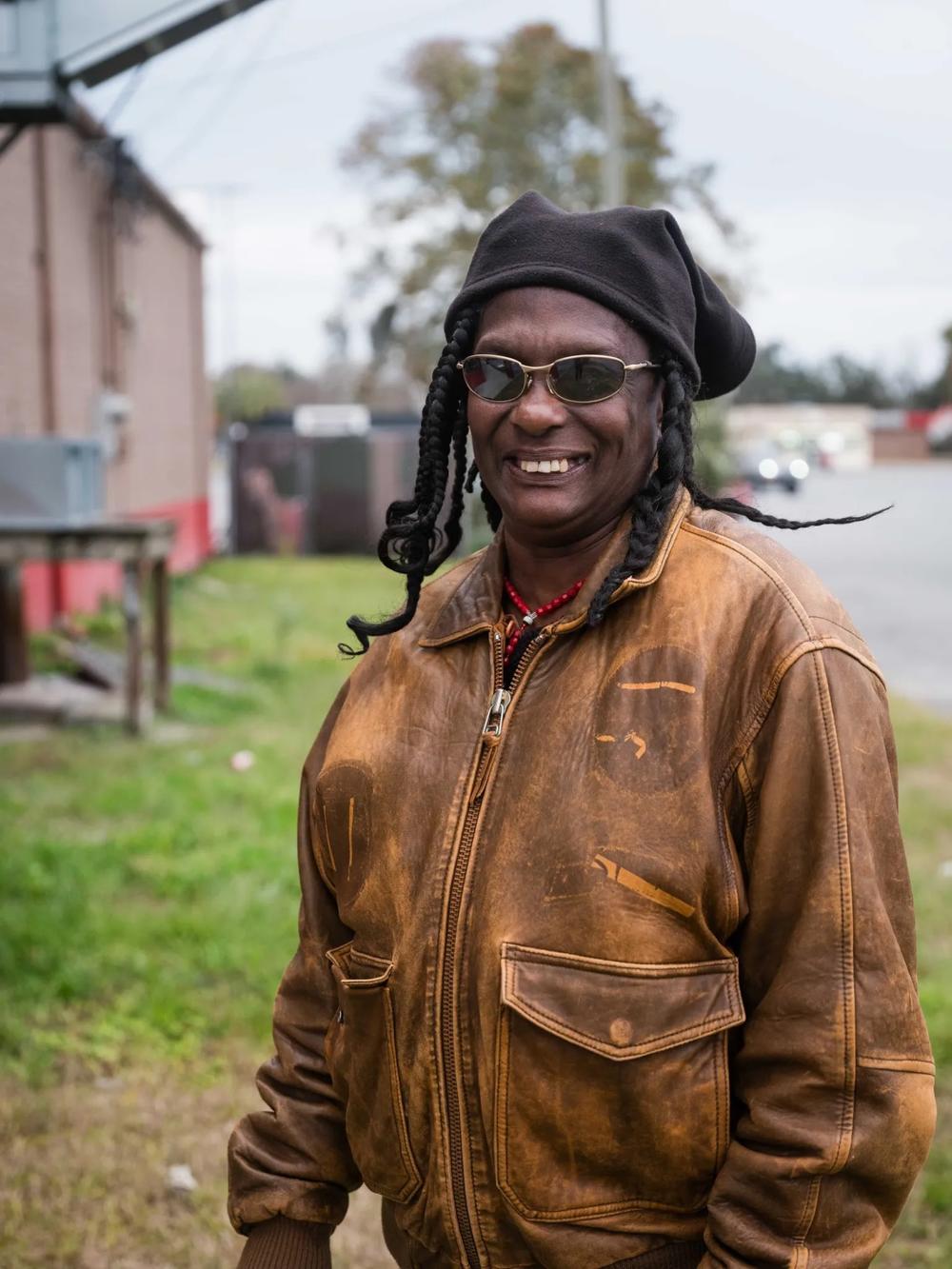
Fraisher Poole, 66, stands behind a local business in the area she typically spends the night, Jan. 4, 2024, in Brunswick, Ga. Poole is one of the first residents selected for a home once the Hand in Hand facility opens.
Pastor John Williams, president of Hand in Hand, says he and the group’s supporters haven’t lost hope that they will achieve their goal of putting a roof over the heads of dozens of Glynn County residents. He describes the journey as 95% complete, and feels hopeful that — unlike years past — new leaders at the city’s housing authority will help them reach the finish line.
“Our goal is not just to get them off the streets, our goal is to get them on their feet,” says Pastor Williams. “They need to feel valued.”
For years the city of Brunswick and wider Glynn County have treated homelessness as a social problem that churches and private groups should handle.
Those policies have been steeped in misunderstanding about the people who comprise the local homeless community. Many business owners in downtown Brunswick see the homeless as public safety threats or nuisances.
That is unfair — and inaccurate, says Sheila Howard, the volunteer coordinator for Hand in Hand. “You know, they are real people, good people, good people with good talents. But nobody gives them a chance,” Sheila says. “Not everybody’s on drugs. They made one decision wrong, and they don’t know how to get up from it.”
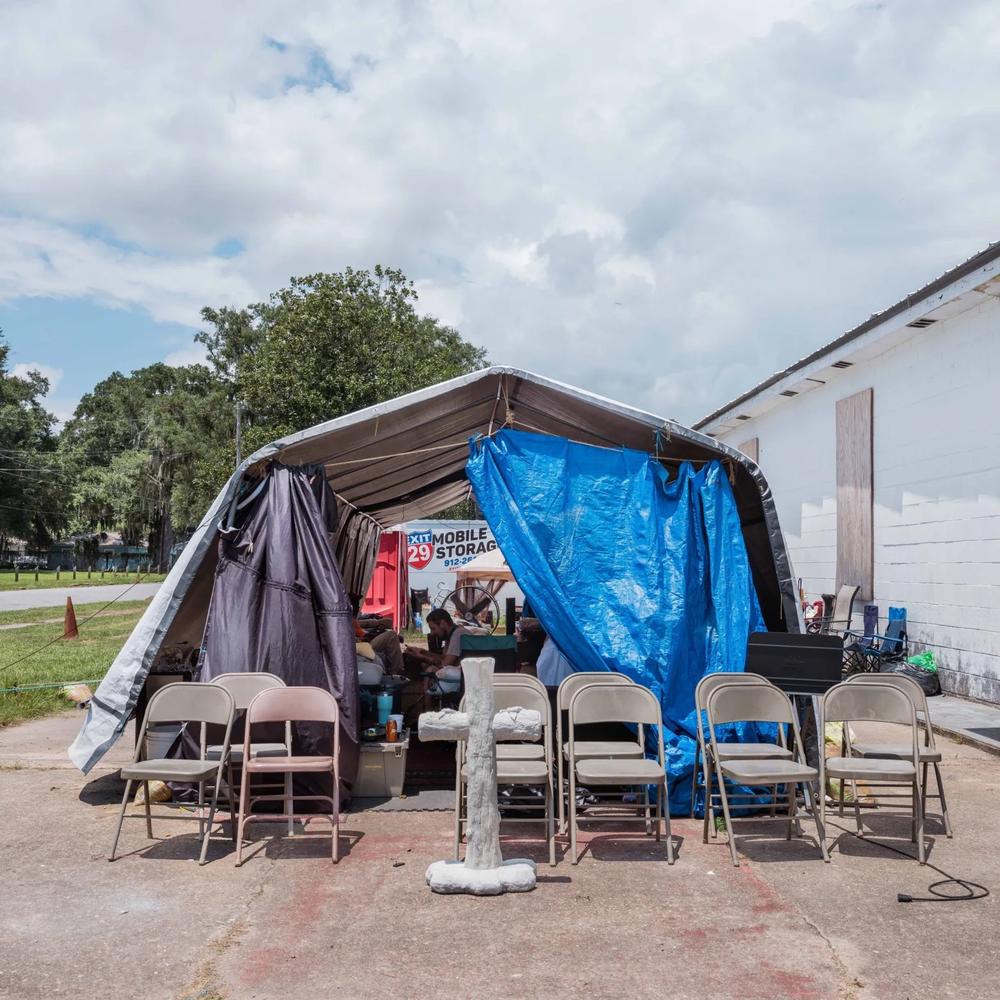
A temporary homeless shelter on G street, Aug, 7, 2023, in Brunswick, GA.
Those misperceptions fueled the October 2022 passage of Brunwick’s Urban Camping and Improper Use of Public Spaces ordinance (Ord. No. 1075, § 1, 10-5-2022) making it unlawful for any person to camp within the city limits, unless approved by the City Commission. The city also passed The Pedestrian and Vehicle Safety Ordinance to prohibit panhandling along roadways. And the Homeless Services Ordinance which now requires that groups providing services to people experiencing homelessness in the city limits must meet specific requirements, obtain a conditional use permit, and an occupational tax license.
Instead of addressing the core issue of homelessness, the ordinances make it harder to reverse the downward slide most in that community are facing, “It basically makes it impossible for people to help the homeless.” says Brunswick attorney Kevin Gough.
The ordinances forced those experiencing homelessness to more remote areas of the county, increasing the distance from essential services like food kitchens, medical clinics and pharmacies.
That was true for Poole, who after a 27-year career in telecommunications, left the workforce and returned to Brunswick 12 years ago to help care for her ill father. After her dad passed, she became the sole caregiver of her mother. In short order, her mother and both of her sisters died.
Life went downhill sharply from here. “Then I got sick,” says Poole, “I couldn’t do things for myself.” A doctor diagnosed her with dementia. “They said … you’re not going to be able to remember things … you’re not going to be able to do the things you used to been able to do.”
Poole’s situation is a common one. According to the National Coalition For Ending Homelessness, a mental health challenge like dementia, bipolar disorder, and schizophrenia is the third largest factor leading to homelessness in America. Mental illness affects 31% of people experiencing homelessness.
Her deteriorating health made work difficult. Unable to stay with her children, she put her belongings into a storage unit and at the age of 62, started living on the streets of Brunswick. When it’s cold, she uses her small Social Security check for a motel room near I-95 and Hwy 341. Those locations, however, aren’t reachable by public transportation, making it difficult and expensive for her to reach essential services only available in the city.
Hand in Hand sees housing as a foundation for improving lives, but not the only service needed to help the least fortunate find their financial and social footing. This philosophy is something that social workers refer to as the Housing First model.
Surrounded by a white cinderblock wall, the organization’s property sits on a 4-acre lot formerly owned by Altama Presbyterian Church.

The 60 tiny homes of Hand in Hand of Glynn, Jan. 4, 2024, in Brunswick.
The project was originally started in 2018 by founder Anne Stembler. After attending a speech by Ron Hall, author of Same Kind of Different as Me, Stembler was motivated to do something about the homelessness situation in Brunswick. She started Hand in Hand of Glynn, with a mission to eradicate chronic homelessness in Glynn County and originally looked to obtain the 24-room, old Brunswick Hospital but faced outrage by neighbors due to a lack of community involvement when picking the location. In December 2020, they broke ground on the Altama Avenue site.
The vision to build a community that meets all the needs of the working poor and elderly meant building a medical clinic, a food pantry, laundry services, workforce training center and mental health facilities along with the compact houses.
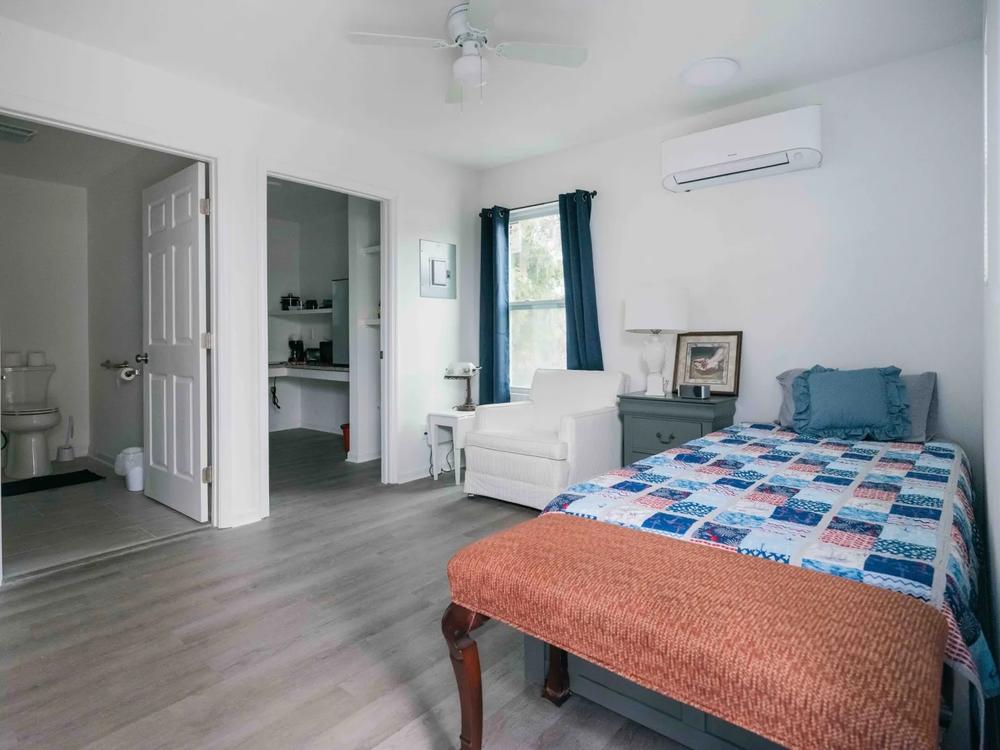
Inside one of the 60 tiny homes at Hand in Hand of Glynn, Dec. 05, 2023, in Brunswick.
Hand in Hand directors knew that if their community was to be sustainable, they needed to work with established federal and state social service programs. That’s why they designed five homes on the property to be compliant with the American with Disabilities Act and incorporated all the standards required by the U.S. Department of Housing and Urban Development.
It’s also why they knew they needed to prioritize a list of residents who were in need of wraparound services. Those with medical, mental health or handicapped needs were prioritized over the county’s larger homeless community of approximately 500 people.
To cover operating costs once residents move in, residents will be charged a “rent” of 30% of any income they receive from jobs or government benefits like Social Security. The remainder of the operating costs, however, need to come from the Housing First Vouchers Program (Section 8) provided by the U.S. Department of Housing and Urban Development.
“Because all the utilities are included, we don’t know what that [cost] looks like in terms of what they’ll use, and an annual cost,” says Williams, “and that’s one of the reasons why we were seeking the vouchers so that we can have some sort of budget to work with.”
Planners also tried to make the project financially sustainable by building energy efficient units. They estimate the yearly cost of housing, utilities, provided services, security, and staff to be around $12,000 per resident, compared to the estimated $35,500 taxpayers spend per individual that’s unhoused.
All that planning and project management has gotten Hand in Hand most of the way to opening. Getting the vouchers, however, has proven to be the last, hardest mile.
Cutting through red tape at the local, state, and federal levels became the project’s most frustrating hurdle.
In theory, the process of obtaining the Section 8 vouchers should be straightforward. HUD gives out vouchers to local public housing authorities and those vouchers are distributed to individuals that meet federally mandated requirements.
HUD vouchers can also be given to a housing complex to assist up to 25% of its residents. This percentage can go higher, however, if a facility caters to the homeless or offers a wider array of services such as mental health and case management.
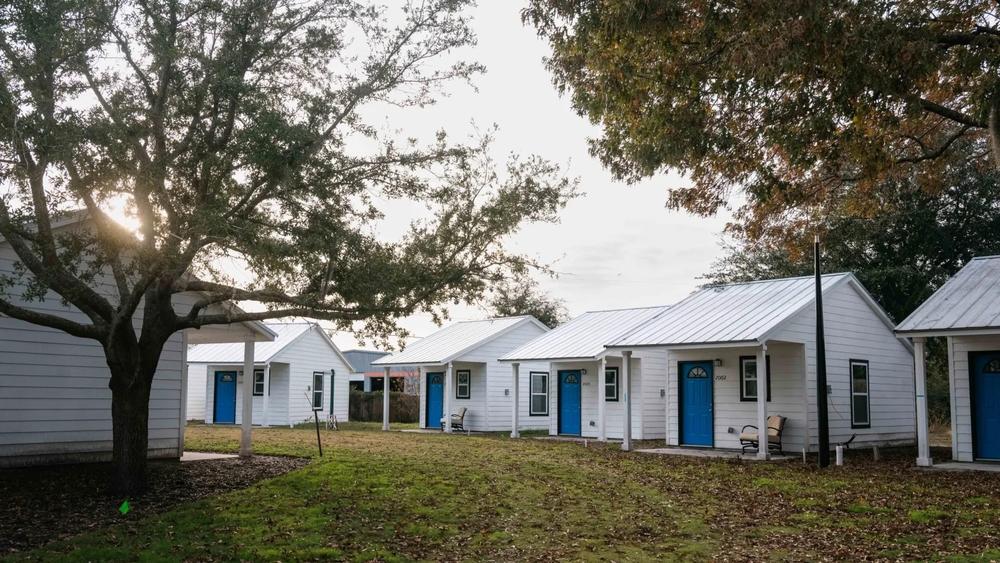
Tiny homes at Hand in Hand of Glynn sit empty waiting for its first residents, Dec. 05, 2023, in Brunswick.
By including all kinds of social services on the Altama Avenue site, Hand in Hand hopes to become the first facility in Brunswick to receive vouchers for 100% of its future residents.
The quest to secure vouchers, however, is where the group has seen one of its biggest challenges.
In May 2022, the Brunswick Housing Authority, led by then Executive Director William Kitts, agreed to provide Hand in Hand with all 60 vouchers they had requested, giving the staff and soon to be residents false hope that they may soon be open. However, BHA gave no further guidance, and the promised vouchers never appeared.
Last March, Brunswick Mayor Cosby Johnson removed Kitts from his job, citing allegations of corruption, mismanagement, sexual harassment. A report from HUD said Kitts had failed to file vital Section 8 paperwork, an omission that threatened all BHA funding for its low-income housing.
In October, Chris Baisden became the new head of the housing authority. He and BHA Section 8 Manager Natasha Douglas have moved swiftly to try to right his ship.
“We aren’t really concerned about what was done wrong, or who was responsible for what was done wrong.” says Braiden, “Our primary goal is how can we fix it? How can we get it done? That’s our focus now.”
In the last six months, Hand in Hand has gotten new advice and guidance about how to resubmit and rework required applications and requirements.
The organization has identified 60 people who meet the federal standard of experiencing chronic homelessness, which is defined as a person who has been experiencing homelessness for at least 12 months.
As of March 1, Pastor Williams says he has a final hurdle to clear. “There’s only one thing left to do and that’s for HUD to sign off on the environmental review.”
Williams says he doesn’t have a fixed time for that clearance to come through. Once that happens, however, Hand in Hand will move swiftly to get their pilot group of 10 residents moved in.
When that happens, Cedrick Muse will be one of the lucky people who will receive a key to a tiny home.
A Glynn County native, Muse became homeless three years ago when he and other workers were laid off from the King Prince Seafood Factory.

Cedrick Muse sits outside of his uncle’s home, Jan. 4, 2024, in Brunswick. Muse has been selected as one of the first residents of Hand in Hand.
With two bags of belongings and no money for rent, Muse started sleeping on the pavement outside of The Well, the downtown Brunswick day shelter for the homeless. “They were just laying off” says Muse of his former employer. “Then, I just had to do what I had to do. I had to go on the streets.”
Muse started volunteering at the day center, and in return they provided him food and a cot to sleep on. He decided to leave The Well after being assaulted and robbed of his clothing, ID, money, and schizophrenia medication.
Muse found part-time work on Sea Island, but his salary isn’t enough to pay rent. Instead he has spent the past year living on the couch in his uncle’s one-bedroom apartment in south Brunswick. According to the National Coalition for the Homeless, 53% of sheltered homeless people like Muse have jobs but are still unable to afford housing of their own.
Hand in Hand wants to solve that core problem by providing solutions to people like Muse who, when given access to social services, can regain financial stability and take care of themselves,
“You know, everybody ain’t out panhandling, everybody ain’t out stealing. Everybody ain’t out doing crime. They’re just stuck,” said Howard.
For now, while Poole waits for the roof over her head that Hand in Hand has promised her, she takes advantage of the soup kitchen at The Well and Manna House. One of the things she is most looking forward to are simple comforts. “I can’t wait!” remarks Poole, with a big smile on her face, “I won’t have to get up in the middle of the night to go out and find a place to go use the bathroom.”
For Muse, a roof over his head means he will have the space and luxury of taking up a cherished hobby: art. “I draw real good.” he says. “I’ll bring all my stuff with me to the tiny house and I’m going to go back to that.”
This story comes to GPB through a reporting partnership with The Current.